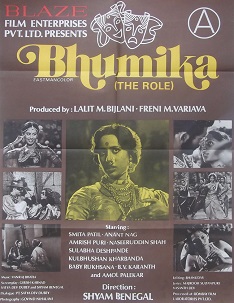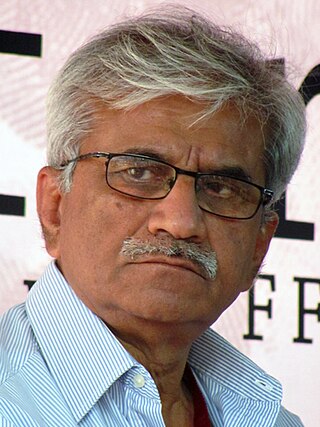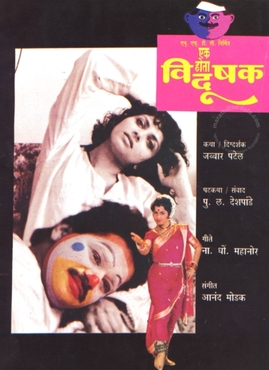
Pandit Hridaynath Mangeshkar is an Indian music director & occasional singer. He is the only son of musician Deenanath Mangeshkar and younger brother of Lata Mangeshkar and Asha Bhosle. He is popularly known as Balasaheb in the music and film industry. He Received Filmfare Marathi Lifetime Achievement Award For His Contribution in Marathi Cinema.

Asha Bhosle is an Indian playback singer, entrepreneur, actress and television personality who predominantly works in Indian cinema. Known for her versatility, she has been described in the media as one of the greatest and most influential singers in Hindi cinema. In her career spanning over eight decades she has recorded songs for films and albums in various Indian languages and received several accolades including two National Film Awards, four BFJA Awards, eighteen Maharashtra State Film Awards, nine Filmfare Awards including a Lifetime Achievement Award and a record seven Filmfare Awards for Best Female Playback Singer, in addition to two Grammy nominations. In 2000, she was honoured with the Dadasaheb Phalke Award, India's highest award in the field of cinema. In 2008, she was honoured by the Government of India with the Padma Vibhushan, the second-highest civilian honour of the country. The Guinness Book of World Records acknowledged her in 2011 as the most recorded artist in music history.

Bhumika is a 1977 Indian film directed by Shyam Benegal. The film stars Smita Patil, Amol Palekar, Anant Nag, Naseeruddin Shah and Amrish Puri.

Smita Patil was an Indian actress who primarily worked in Hindi and Marathi films. Regarded among the finest and greatest actresses in the history of Indian cinema, she was known for her unconventional portrayal of strong and independent women. Patil appeared in over 80 films, in a career that spanned over a decade and was the recipient of two National Film Awards, a Filmfare Award, a Maharashtra State Film Award and two Filmfare Awards Marathi. In 1985, Patil received the Padma Shri, India's fourth-highest civilian honour.
Gopal Nilkanth Dandekar aka Appa Dandekar was a Marathi writer from Maharashtra, India.

Dr.Jabbar Patel is a former paediatrician and a Marathi-language theatre and film director of India. His production of Vijay Tendulkar's play Ghashiram Kotwal, in 1973 is considered a classic in Modern Indian Theatre. He has received several accolades, including seven National Film Awards, eight Maharashtra State Film Awards, seven Filmfare Awards Marathi. Patel received Filmfare Marathi Lifetime Achievement Award at 7th Filmfare Awards Marathi. He was awarded Sangeet Natak Akademi Award in 1978. In 2005, he was honoured with the V. Shantaram Award, Maharashtra's highest award in the field of cinema. In 1982, he was honoured by the Government of India with the Padma Shri, the fourth-highest civilian honour of the country.

Usha Mangeshkar is an Indian singer who has recorded many Marathi, Manipuri, Hindi, Bengali, Kannada, Nepali, Bhojpuri, Gujarati, Odia and Assamese songs. She is the youngest among four Mangeshkar sisters, after Lata Mangeshkar, Meena Khadikar and Asha Bhosle as well as only elder from brother Hridaynath Mangeshkar.

Samna is a 1974 Marathi-language crime drama film directed by Jabbar Patel and written by Vijay Tendulkar. The film starring Mohan Agashe, Nilu Phule, Shriram Lagoo, and Smita Patil in key roles. It was entered into the 25th Berlin International Film Festival and also won National Film Award for Best Marathi Feature Film at 23rd National Film Awards.

Umbartha is a 1982 Indian drama film produced by D. V. Rao and directed and coproduced by Jabbar Patel. The film was simultaneously shot in Marathi and Hindi, the latter titled Subah, with the same cast. It tells the story of a woman's dream to step outside her four walled home and bring change in the society. Smita Patil played the lead protagonist in the film for which she won Marathi Rajya Chitrapat Puraskar for Best Actress. The film was adjudged as the Best Feature Film in Marathi at the 29th National Film Awards for "a sincere cinematic statement on the theme of a woman seeking to establish her identity by pursuing a career, even at the risk of alienation from her family".
Sinhasan is 1979 Indian Marathi-language political drama film directed by Jabbar Patel and written by journalist Arun Sadhu. The film is based on two novels - one of the same name and the other named Mumbai Dinank by writer and freelance journalist Arun Sadhu. The film starring Nilu Phule, Arun Sarnaik, Shriram Lagoo, Mohan Agashe, Reema Lagoo, Nana Patekar, Usha Nadkarni, Datta Bhatt and Satish Dubhashi. Film Won National Film Award for Best Marathi Feature Film at 27th National Film Awards.

Meena Khadikar is an Indian Marathi and Hindi playback singer and composer. She is the second eldest daughter of Pt. Deenanath Mangeshkar and sister of veteran singers Lata Mangeshkar, Asha Bhosle, Usha Mangeshkar and Hridaynath Mangeshkar.

Ek Hota Vidushak is a 1992 Marathi film directed by Jabbar Patel and produced by National Film Development Corporation of India. The film stars Laxmikant Berde, Madhu Kambikar, Nilu Phule, Varsha Usgaonkar in lead roles and Mohan Agashe and Dilip Prabhavalkar in supporting roles.

Ravindra Sathe (born 7 February 1951) is an Indian playback singer in Marathi film industry. He was the original cast and crew member of famous Marathi theatre play ‘’Ghashiram Kotwal’’. He had been awarded Maharashtra State Film Award for Best Male Playback Singer 10 times.
Mukta is a 1994 Marathi film directed by Jabbar Patel. The film stars Shreeram Lagoo, Sonali Kulkarni, Reema Lagoo and Vikram Gokhale in lead roles. Mukta won the 1994 National Award for Best Feature Film on National Integration. It is considered one of the important Marathi films for the period 1993–98.
Balmohan Vidyamandir was founded on 3 June 1940 by Late Shri. S.D.Rege alias "Dada" as he was fondly known amongst his students, parents and the community, was a teacher par excellence. The School was named "Balmohan Vidyamandir". "Balmohan" being coined from the names of Lokmanya Bal Gangadhar Tilak and Mohandas Karamchand Gandhi and "Vidyamandir" meaning a temple of learning. Today, the name "Balmohan Vidyamandir" is synonymous with being the leading cultural and educational hub of the State of Maharashtra, India.
The Mangeshkar family is a prominent Indian family, headed by Deenanath Mangeshkar. The family is of Marathi and Konkani origin.

Mandar Dnyaneshwar Agashe is an Indian businessman, music director, and former musician. Best known for having founded Sarvatra Technologies in 2000.












